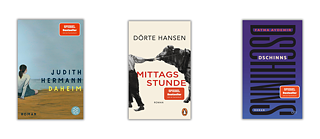Teresa Ciuffoletti has translated works by Judith Hermann, Dörte Hansen and Fatma Aydemir into Italian. In this interview, she explains why she doesn't use translation tools, what North Friesland and Tuscany have in common and which book she would like to translate one day.
Teresa Ciuffoletti, when was the last time you had to laugh while translating?At my typos. Sometimes, when I read my translation the next day, I think: What have I written here?
What fascinates you about German literature?
That may sound disappointing, but it's actually nothing specific. First and foremost, I'm fascinated by the German language itself. The nice thing about my work is that I can rediscover it again and again.
You translated Judith Hermann's Daheim into Italian. The novel was praised for its skillful use of ellipsis. Was translating the unspoken and the laconic style a particular challenge?
Yes and no. Translating such a dense and precise language, which never feels heavy or overworked, is of course a challenge. You have to think a lot about what is left unsaid and constantly refine your translation. At the same time, Judith Hermann has a style that suits me. I find it more fitting than flowery language.
What do you do when you get stuck on a translation?
I take a break—or I bother my friends with my problem. Some enjoy it, some really don’t. I also try to read a lot on the topic. That often helps me move forward.
Translating a book is like having a roommate. By page 100, you start to have problems.
Teresa Ciuffoletti
You translated Dörte Hansen's bestseller Mittagsstunde into Italian. Both Hansen and Hermann focus on rural culture and village life. You live in Berlin: What makes this topic so appealing to you as a city-dweller?
The topic is close to my heart. I come from a small provincial town in Tuscany and now live in Berlin. This tension between big city and province, city and countryside, the search for belonging, has been something that preoccupies me for a long time and is closely tied to my family history. Some of my Italian relatives have read Mittagsstunde and recognized many aspects of village life. And yet North Friesland is very far from Maremma, my home region in Tuscany. In Italy, we say: The whole world is one village.
Are you actually in direct contact with the authors during your translation work?
So far, yes. For me, this exchange is very important, especially to clarify certain aspects of the text. I often say that translating a book is like having a roommate. By page 100, you start to have problems, but in the end, you love each other anyway. The relationship with the authors, however, is different; it usually leads to interesting exchanges and sometimes even great encounters.

Novels by Judith Hermann, Dörte Hansen and Fatma Aydemir – translated by Teresa Ciuffoletti for the Italian audience. | Foto © S. Fischer, Penguin, dtv
For some texts, translation programs are useful tools. But I don't believe they can replace the human art of literary translation. Lately, I’ve noticed that short articles or posts have often been translated by machines. There’s a real danger of language becoming impoverished and flattened.
It doesn't sound like you use translation programs much yourself?
I’ve tried, but you’re strongly influenced by the automated translation. You have to heavily edit the text afterward. It becomes an extra task to free yourself from that tone and stay true to the original. So, no, these tools don’t really help me.
Your most recent work is the translation of Fatma Aydemir’s novel “Dschinns“. It tells the story of a German-Turkish family. How are migration stories like this received in Italy?
The novel deals with a topic that affects Italy as a country of immigration. Migration has always been a significant issue in Italy, but also in the opposite direction. Italy has always been a country of emigrants as well. So, this theme resonates. However, the book hasn’t been published yet, so I don’t know how it will be received.
If you could choose: Which German-language work would you like to translate one day?
Probably Expressionist poetry. Georg Trakl, for example. I read his poems when I was 18, and I was fascinated at the time.
October 2024
